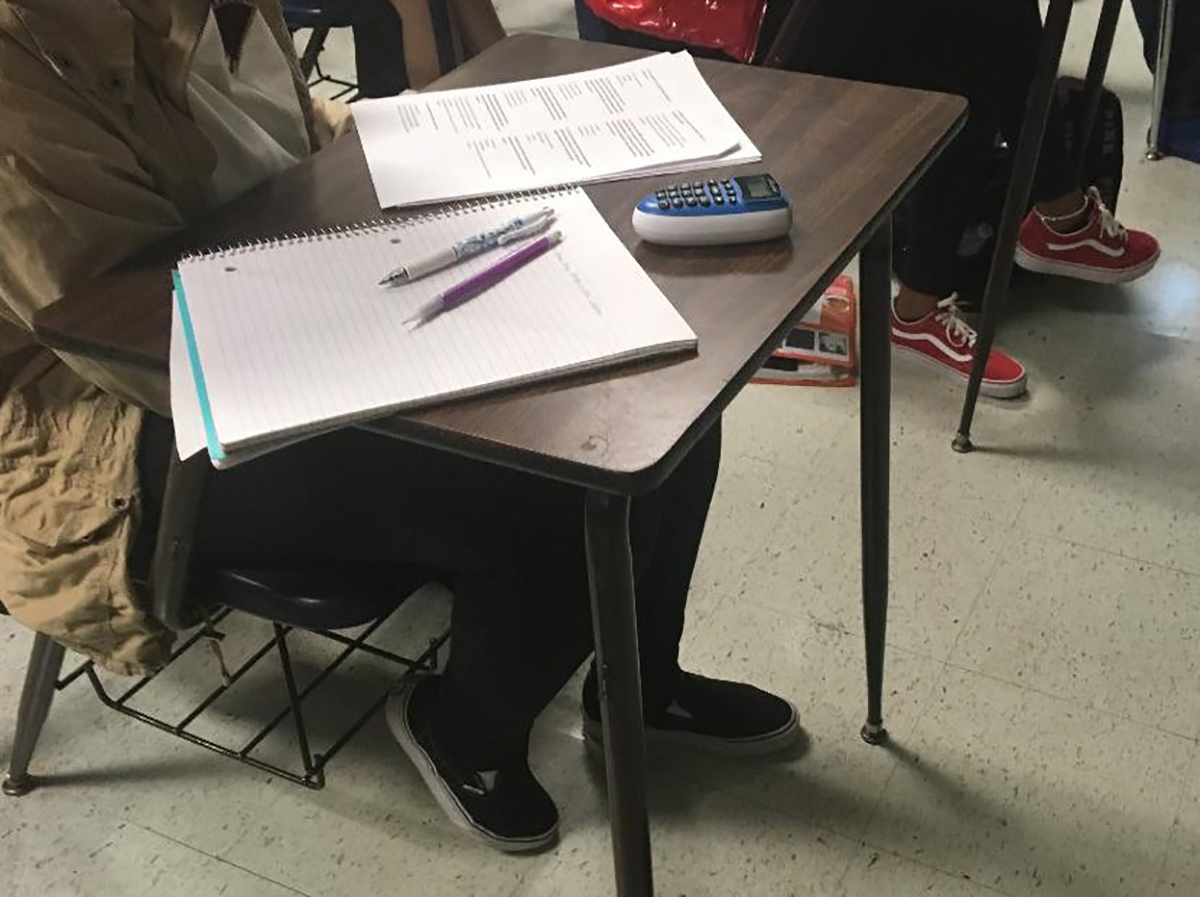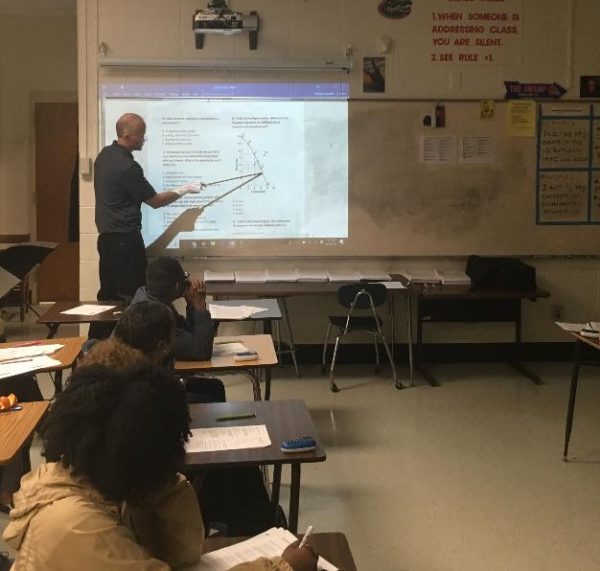Districts Test Out Possible Alternatives To Georgia Milestones

Students at Cobb County’s McEachern High School use electronic devices to record answers to tests and quizzes. The results are recorded instantly.
Martha Dalton / WABE
Public school students across the state will take the Georgia Milestones assessment this week. School districts were able to start testing elementary school students as early as April 8. High school students could finish as late as May 31. Georgia Milestones is the state-issued standardized test students have to take at the end of a year or a course.
However, some school districts have launched testing pilot programs to develop their own assessments. The hope is that those exams could replace Georgia Milestones one day.
The High Stakes Debate
Georgia Milestones is a summative assessment, meaning it’s given to every student at the end of a year or course to see what they’ve learned.
“They usually count for something that has some consequences for the students and or the teachers,” says Gregory Cizek,a professor of educational measurement and evaluation at the University of North Carolina at Chapel Hill. “So, we call these typically ‘high stakes’ tests. They would be standardized, meaning that they would be the same for everyone and they would usually be used for some accountability purpose.”
The high stakes involved in year-end testing have been controversial. Most notably, they were highlighted in 2014 during the Atlanta Public Schools cheating trial, where a dozen former educators were tried for racketeering after allegedly erasing answers on students’ tests to keep their jobs and secure bonuses.
High stakes haven’t completely disappeared since then. State officials use Georgia Milestones scores to calculate scores on the College and Career Ready Performance Index (CCRPI). The index is used to evaluate schools. In addition, schools can use the test scores to determine whether to promote or retain a student. Administrators factor student growth (a measure included in the test results) into teacher evaluations.
A Turning Tide?
In 2018, the state legislature passed Senate Bill 362, which lets up to 10 school districts or groups of districts to develop ‘innovative assessments.’ The idea is to come up with smaller, more frequent tests that schools could eventually use instead of Georgia Milestones.
The Georgia Board of Education approved three pilots: one from the Cobb County School District, a consortium assessment from Putnam County, and a group of districts called the Georgia MAP Assessment Partnership.
Federal law requires states to give one standard assessment at the end of the school year. So, Georgia has applied for a waiver so the pilots can move forward.
So having more frequent testing allows me to jump on problems immediately and fix them.
Dr. Matthew Lawrence, a history and economics teacher at McEachern High School in Cobb
In its pilot, Cobb County is using an electronic system it built for its teachers. The Cobb Teaching and Learning System (CTLS) is district-wide. It lets teachers share test questions aligned to state standards. Teachers can track students’ grades and see their answers to every quiz and test question. This allows teachers to quickly target where students are succeeding and failing.
“I can immediately take a look…and see, for example, my students really struggle with marginal analysis, marginal decision making,” says Dr. Matthew Lawrence, a history and economics teacher at McEachern High School in Cobb.
Lawrence starts almost every one of his economics classes with a quiz. Before CTLS, Lawrence said, it might take a few days to grade them and get them back to everyone. But this system lets him see his students’ answers in real time. They get their grades as soon as they finish the quiz.

After class, he can analyze who needs help and who needs to move ahead.
“I can immediately look…and figure out what I need to accelerate my instruction on and what I need to remediate my instruction and ‘bam,’ it’s right there,” he says.
In a way, the three pilots are competing against each other. Due to current law, state officials could only choose one to scale up statewide.
“They would first have to establish comparability with the state assessment system,” says Allison Timberlake, Georgia’s Deputy Superintendent for Assessment and Accountability.
Through their pilots, the districts involved would need to show their systems provide teachers the same information Georgia Milestones does. Each of the pilots would do that through the use of smaller, more frequent tests, called formative assessments.
“They’re usually given for the purpose of helping a teacher to understand how better to teach students what to do for them next what to review or remediate,” says Gregory Cizek. “And they’re often given for the purposes of helping students understand their progress and what the student needs to do to change the course of what he or she is doing.”
It Helps ‘Majorly’
Lawrence’s students will soon take the Georgia Milestones end-of-course test. He doesn’t have a problem with the summative assessment but says he doesn’t have a lot of time to help a student who may not do well.
“They’ve demonstrated that they don’t understand the material, but at that point, I can’t do anything about it because the year is over,” he says. “So having more frequent testing allows me to jump on problems immediately and fix them.”
The process of getting federal approval, choosing a pilot to scale up, and then implementing that plan could take several years. In the meantime, Lawrence’s students say they’re ok with the frequent quizzes he gives.
“Once I get my grade from what I get on the quiz, I can then see what I need to study more because we do go over and review the quiz,” says Aliyah Sirmons, a senior. “I can see more of what I need to study personally.”
Fellow senior Syed Ahmed finds the quizzes helpful too.
“Starting the day off with a quiz actually helps prepare for like what you’re going to learn in the class, or what you’ve previously learned, and it also helps majorly on like, tests,” he says.
That includes the Georgia Milestones, he says, which he’s stuck taking for now.








